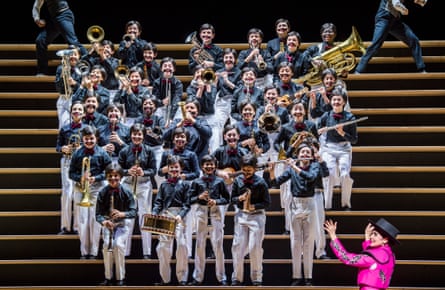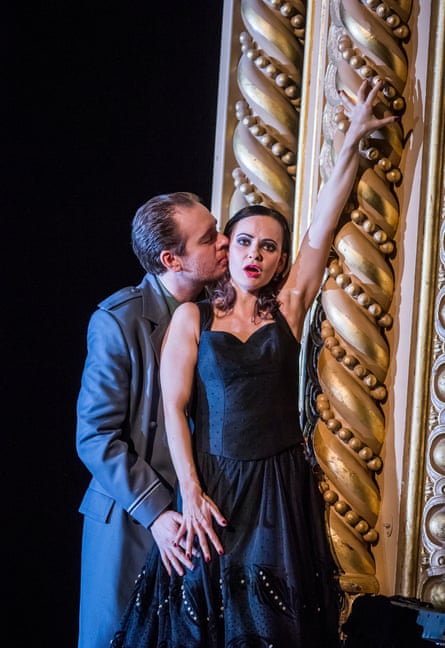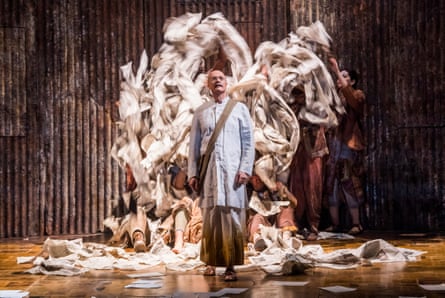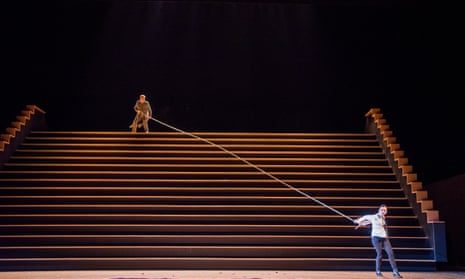There’s nothing like a binge of whistleable tunes, a generic sexy heroine and a toreador shrink-wrapped into a suit of lights to draw the crowds. We all have an idea of Carmen. It invariably includes a red rose between red lips and plenty of hip-flicking. With its multiple versions and unreliable sources, Bizet’s 1875 opera ranks highly both as director’s nightmare and audience favourite, with spin-offs in every medium, from Carmen Jones the musical to a hip hopera film starring Beyoncé.
The music is the wellspring. Georges Bizet wrote his unfailing masterpiece shortly before his early death aged 36, never knowing it would become so successful. The Australian director Barrie Kosky’s ingenious, flawed new staging for Covent Garden, in all its joyful, at times incoherent variety, dispenses with cliche and challenges every preconception about this work. How refreshing.
First seen at Frankfurt Opera in 2016, this Carmen will not necessarily add to the work’s popularity. The first-night response was politely warm, understandably. It’s crazy, irritating, funny, provocative, at times boring, mostly gripping, far too long, forgettable, memorable – all told, a bundle of contradictions, like the Gypsy herself.
Kosky, artistic director of Berlin’s Komische Oper, first made a mark in the UK in 2015 with Saul at Glyndebourne, followed by The Nose at the Royal Opera House (2016). One of his tropes – there are others, overworked, mostly to do with rope – is to keep the stage bare and create spectacular human tableaux. All takes place on a vast, Odessa steps-style staircase which fills the stage throughout. The chorus, who sang magnificently, including children from the ROH Youth Opera Company, should have been paid danger money for all that precipitous tumbling and sculptural regrouping, but running up 16 stairs must be health-giving.

Koskie and designer Katrin Lea Tag allude visually to silent film and cabaret via Battleship Potemkin, Marlene Dietrich’s gorilla suit in Blonde Venus, and a dance cocktail of Martha Graham, Pina Bausch and 1980s boy-band choreography – think European deconstruct-mashup, elegantly done. The dominant idea is that this French opera has nothing Spanish about it. No Seville, no cigarette factory, no mountains, but you didn’t miss them. Bizet’s Parisian idea of Spain is there in the music, from the wafts of smoke to the castanet rhythms.
Do we get any closer to Carmen herself? Archetypal male femme-fatale fantasy she may be, yes, but the eternal feminine or everywoman, no way. She represents only herself, as created rather bluntly by Mérimée in his original novella, and reshaped with some subtlety – though usually you’d never guess – by Bizet’s librettists, Meilhac and Halévy. Kosky presents her as playful and coquettish, full of ambiguity, credible. It’s a strength of this production. We don’t even have to pretend to find her sympathetic. As played by Anna Goryachova in the first of two casts, Carmen becomes fascinating, bewitching, strongly androgynous and not a woman you’d want as friend or enemy.

Goryachova’s intonation and vowels were problematic but, making her ROH debut, she compensates with her vital, agile stage presence. Francesco Meli, as the dull lover Don José, started unsteadily but warmed to a part that, despite lyrical moments, never suggests he is anything but coward and dud. Kostas Smoriginas, trussed up in pink and gold like a prize turbot, is a stolidly good Escamillo. Carmen doesn’t love him either. Kristina Mkhitaryan shines as the innocent Micaëla, though her scene is downplayed to excess.
Kosky plays the opera light – it is, strictly, an “opéra comique” – until the moment Carmen reads her own death in the cards. There’s a twist at the end that backfires, but it may not be played that way every night. The disembodied, amplified French narration, a valid solution to problems of dialogue or recitatives, nearly succeeds. The cast is not vintage, but the orchestra, conducted by Jakub Hrůša in his ROH debut, performed with fine colour and detail using the new edition by Michael Rot. You may not think you want the additional music, mostly Bizet’s earlier efforts, this version provides – the evening runs for nearly four hours and Hrůša favours slowish tempi – but it’s worth a hearing, once anyway. Be annoyed, be delighted. It’s relayed live in cinemas on 6 March.
In his Funeral Song, Op 5, its missing parts rediscovered in a back room in St Petersburg Conservatoire library in 2015, Stravinsky paid homage to his teacher Rimsky-Korsakov (1844-1908). The short, plangent orchestral work, having won an instant place in the repertoire with 77 performances already, formed a central part of the London Philharmonic Orchestra’s second concert in Changing Faces: Stravinsky’s Journey, a year-long series devised by principal conductor Vladimir Jurowski, which started last weekend.
Whereas the additions we heard in Carmen intrigued, as discarded artistic thoughts often do, the Funeral Song (1908) is far more exciting: the missing link between Stravinsky’s lush, early works, rooted in romanticism including Wagner, and the rhythmically explosive, melodically fragmented ballets for Diaghilev – The Firebird, Petrushka, The Rite of Spring – which followed. Rimsky’s single-movement Piano Concerto, rarely heard and drawing on folk song, was attractive in its tuneful virtuosity (soloist Alexander Ghindin) and charmingly led nowhere in particular. Jurowski conducted a searing, precise account of The Firebird (original version, 1910), brass dispersed on an offstage, section soloists excelling: in a familiar work you focus differently with each encounter. This time I particularly fixed on principal viola (David Quiggle) and E flat clarinet (Thomas Watmough), but every player merited attention.
Quick praise for Satyagraha, Philip Glass’s 1979 opera, which is back at ENO with four performances left. Toby Spence, singing Gandhi, heads the strong cast and chorus, adroitly conducted by Karen Kamensek. Phelim McDermott’s production remains as visually stunning as you’ll find. Stuck for Valentine’s Day? Why not a meditative opera in Sanskrit? It’ll sort out any off-on relationships once and for all.

Star ratings (out of 5)
Carmen ★★★
Changing Faces: Stravinsky’s Journey ★★★★
Satyagraha ★★★
- Carmen is in rep at the Royal Opera House, London, until 16 March
- Satyagraha is in rep at the Coliseum, London WC2; until 27 Feb

Comments (…)
Sign in or create your Guardian account to join the discussion